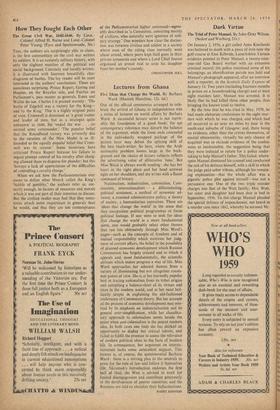How They Fought Each Other
The 'Great Civil War, 1642-1646. By Lieut.- Colonel Alfred H. Burne and Lieut.-Colonel Peter Young. (Eyre and Spottiswoode, 36s.)
THIS, the authors are surprisingly able to claim, is the first commentary on the civil war written by soldiers. It is an austerely military history, with only the slightest mention of the political and social background. Concisely and lucidly written, it is illustrated with fourteen beautifully clear diagrams of battles. The lay reader will be most interested in the authors' conclusions. These are sometimes surprising. Prince Rupert, Goring and Hopton, on the Royalist side, and Fairfax on Parliament's, pass muster as generals. Essex and Waller do not. Charles I is praised warmly : The battle of Edgehill was a victory for the King— and by the King.' This is a highly original point of view. Cromwell is dismissed as 'a great trainer and leader of men, but as a strategist quite unknown' in 1646. He 'ended the war . . . an untried army commander.' The popular belief that the Roundhead victory was primarily due to the creation of the New Model is as ill- founded as the equally populai belief that Crom- well was its creator.' Some historians have criticised Prince Rupert because his failure to regain prompt control of his cavalry after charg- ing allowed them to disperse for plunder; but this 'betrays a lack of appreciation of the difficulties of controlling a cavalry charge.'
When we ask how the Parliamentarians ever came to defeat what Monck called the King's 'rabble of gentility,' the authors refer us, cor- rectly enough, to factors of resources and morale which it was not part of their intention to discuss. But the civilian reader may feel that they some- times attach more importance to generals than he would, and that they are too contemptuous of the Parliamentarian higher command—agree- ably described as 'a Committee, consisting mainly of civilians, who naturally were ignorant of mili- tary strategy.' One wonders how clear the distinc- tion was between civilian and soldier in a society where men of the ruling class normally went about armed, where peers kept field guns in their private armouries and where a Lord Chief Justice organised an armed raid to seize his daughter from her mother's custody.
CHRISTOPHER HILL


































 Previous page
Previous page